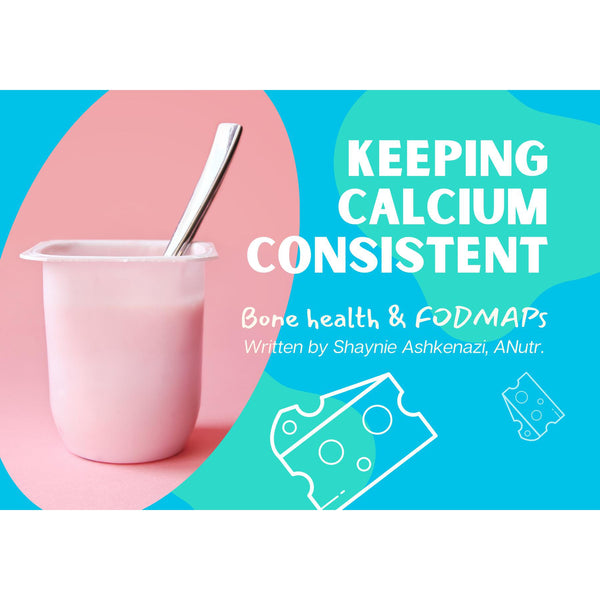- Ph: +61 435 003 412
- operations@fodshopper.com.au
"Organic Orange" has been added to your cart. View cart
"Organic Orange" has been added to your cart. View cart

Written by Shaynie Ashkenazi BSc MHumNutr, FodShop Founder & Registered Associate Nutritionist
Calcium is a nutrient which plays an important role in development of the bones and skeleton and the normal functioning of the muscles and heart, regardless of any FODMAP intolerances.
The presence of calcium in the bones & teeth provides strength and structure to the musculoskeletal system.
Calcium requirements change over our lifetime per the table below:
|
Age group |
Calcium requirements (per day) |
|
Children 4-8yrs |
700mg |
|
Children 9-11yrs |
1000mg |
|
Teenagers 12-18yrs |
1,300mg |
|
Adults 19-30yrs |
1,000mg |
|
Adults 51years+ |
1,300mg |
From birth to puberty, bone mass increases dramatically, and then remains stable until middle age in men and until menopause in women.
During the adolescent growth spurt, calcium requirements become 2-3 times higher for the development of bone mass.
Calcium is found naturally in dairy foods including milk, yoghurt, cheese and non-dairy calcium-fortified alternatives including firm tofu, tempeh, nut ‘mylks’, nuts including almonds, walnuts, pumpkin seeds, leafy greens such as spinach & kale and canned fish with bones.
Dairy foods are a source of lactose.
When you commence a low FODMAP diet for the management of IBS symptoms, you may at first think that all dairy products should be eliminated due to the presence of lactose (the ‘D’ in FODMAP).
The truth is, you only need to eliminate dairy if you have been diagnosed with lactose intolerance. Please discuss this with your Accredited Practising Dietitian.
If you do have a diagnosis of lactose intolerance, or suspect that you have it (undiagnosed), it is important you try to keep your calcium intake optimal via the foods that you choose to eat.
The reason for this, is that chronic low calcium intakes due to ongoing restriction can increase risk of osteoporosis, which can result in falls and fractures in later life. At particular risk, are postmenopausal women.
If you do have lactose intolerance and IBS, there are a few ways you can still keep your calcium intake optimal while following a low FODMAP diet:
Consuming small amounts of dairy regularly, across the day, can improve tolerance. Tolerance may also be achieved by consuming dairy products as part of a meal e.g. a bowl of Active Oats with half a cup of milk (125ml), rather than in isolation (drinking milk on its own).
While this won’t help you to build tolerance over time, it can help in the short term by providing a ‘pre-digested’ form of lactose, making it far easier to digest. An example is lactose-free cow’s milk.
You may also like to know that there are many dairy products like Greek yoghurt and hard cheeses (cheddar, parmesan, tasty cheese etc..) which do not contain any lactose at all!
Consuming these dairy products makes for an excellent way to include extra calcium into your diet. Why not top your spaghetti bolognese with grated parmesan, add a slice of tasty cheese to your next burger, or dollop your no onion no garlic curry with a tablespoon of Greek yoghurt?
These contain the enzyme ‘lactase’, which when taken according to packet instructions, can assist in breaking down the lactose in food.
The below products are available at FodShop to assist with this:
Lacteeze Drops Natural (15.5mL)
Lacteeze Children's Strength Strawberry Flavour (100 Tablets)
Lacteeze Double Strength 40 Caplet - Vanilla Flavour
Lacteeze Double Strength 8 Caplet - Vanilla Flavour
Lacteeze Chewable (Mild Mint Flavour) 120 Tablets
Lacteeze Chewable (Mild Mint Flavour) 10 Tablets
The IBS Symptom Success Pack (500g)
Final thoughts
The low FODMAP diet is aimed towards symptom management. This can be achieved while keeping calcium intake optimal, whether you choose dairy and/or plant-based options.
If you are self-restricting or unsure of how you can self-manage your IBS, please refer to our Gut Health Expert Directory to find a qualified dietitian to assist you.
References:
Hertzler SR, Savaiano DA. Colonic adaptation to daily lactose feeding in lactose maldigesters reduces lactose intolerance. The American journal of clinical nutrition. 1996;64(2):232-6.
Hertzler SR, Savaiano DA, Levitt MD. Fecal hydrogen production and consumption measurements. Response to daily lactose ingestion by lactose maldigesters. Digestive diseases and sciences. 1997;42(2):348-53.
Suarez FL, Savaiano D, Arbisi P, Levitt MD. Tolerance to the daily ingestion of two cups of milk by individuals claiming lactose intolerance. The American journal of clinical nutrition. 1997;65(5):1502-6.
Lactose and dairy products on a low FODMAP diet, 2017 https://www.monashfodmap.com/blog/lactose-and-dairy-products-on-low/
The Nutrient Reference Values for Australia & New Zealand, 2014 https://www.nrv.gov.au/nutrients/calcium.

Leave a reply